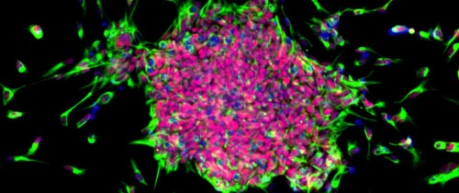Wednesday 5th July 2017, 9:45am
Scientists at Censo Biotechnologies are developing a new approach to cancer research using stem cell technology. In collaboration with the Leeds Institute of Cancer and Pathology at the University of Leeds, Censo will create induced pluripotent stem cells (iPSCs) from brain tumours removed from patients as part of their clinical treatment. The stem cells will be used in the project to identify drugs which could prevent or limit the growth of brain cancer cells.

Co-funded by the UK’s innovation agency, Innovate UK, the two year project is one of the first major programmes to create iPSCs from cancer tissue.
Cancer Research Technology will support the drug discovery phase of the project, providing guidance, and helping identify and source ways to test prospective drugs.
The researchers will focus on the most aggressive type of brain tumour, high-grade glioma (HGG). These tumours are extremely difficult to treat and even with the best treatment available today, the typical patient with HGG will only survive twelve to fifteen months after diagnosis on average. Until now, it has not been possible to investigate the earliest stages of the development of these tumours, which occur before the patient is diagnosed.
At Leeds, the Stem Cells and Brain Tumour Group, led by Dr Heiko Wurdak, has worked with Mr Ryan Mathew from the Department of Neurosurgery to use iPSC technology to study the “cancer genome” of HGG by reprogramming to the stem cell stage. This approach is expected to open new investigation avenues in the laboratory shedding light onto mechanisms of tumour initiation and development.
First pioneered in 2006, iPSC technology makes it possible to create stem cells from almost any tissue sample, normally a person’s healthy tissue is used. In contrast, the Patient Derived iPSCs for High Grade Glioma (PDi:HGG) project will use tumour cells as the starting material.
Researchers plan to use the newly-generated tumour cells to better represent patient-to-patient differences in laboratory studies with the primary goal to find answers why the tumour cells fail to behave like healthy brain cells, and to identify tumour cell vulnerabilities that can be exploited for personalized cancer medicine.
A specific focus of the research will be to find drugs which force brain tumour stem cells to develop into a more mature, less aggressive state and to investigate how cancer cells can change their characteristics to evade and survive conventional cancer treatments.
“Censo has established an unrivalled expertise amongst companies to create new iPSC lines from human tissue. We believe that patient derived iPSCs (PDi) will have a profound effect on the way that new drugs are developed and ultimately the way that clinicians determine the best treatment for a specific patient. Our HGG programme will provide a first opportunity for Censo to support cancer research. This is a ground breaking collaboration which has the prospect of creating a new means of investigating how this cancer develops and why it is so aggressive. If successful, it will allow scientists at Censo, Leeds University and elsewhere to study the close relationship between stem cells and cancer cells.”
Aidan Courtney, CEO of Censo Biotechnologies“Many brain cancer patients are facing a disease with a dismal prognosis and better treatments are urgently required. It is challenging to develop better therapies for a cancer that entails more than one hundred tumour types, numerous clinical subtypes, and a broad spectrum of patient-to-patient differences. We are very excited by the prospect of generating a considerable number of new brain cancer models, which we hope will represent many of the patient-to-patient differences observed in the clinic. This stem cell technology-based project will provide a near infinitive resource for studying how the patient-specific features of an aggressive tumour (such as the genetic information) influence the growth of tumour stem cells that are resistant to therapy. We hope that this new avenue towards drug discovery will help to further develop precision medicine for brain cancer providing improved options for the efficient treatment of aggressively growing tumours.”
Dr Heiko Wurdak Stem Cells and Brain Tumour Group, University of Leeds“This exciting new approach could enable the discovery of potential new targeted treatments using tumour cells taken directly from patients and reprogrammed to grow in the lab. “Finding new ways to carry out large-scale drug screens on lab-grown tumours without them losing their relevant properties is a critical challenge for the drug discovery industry. We hope that our guidance and support will drive the discovery of innovative treatments and change the outlook for many patients with brain tumours.”
Dr Stuart Farrow, Cancer Research Technology’s director of biologyCenso Biotechnologies has extensive capacity to create and use induced Pluripotent Stem Cells (iPSCs) for drug discovery research with sites in Edinburgh and Cambridge, UK. The Company uses this capacity to produce stem cells from large diverse groups of individuals, so that drug development companies can understand how the efficacy of their drugs varies across the population.
This underpins faster drug development and enables the right drug to be targeted to the right patient.Drug discovery companies are increasingly recognising that iPSC technology will allow them to test potential new drugs in the laboratory more effectively – reducing the risk of expensive failures in clinical trials. Because human disease models are usually preferable to animal models, iPSC technology is expected to lead to fewer experimental animals being needed in future disease research.
For further information, please contact:
Aidan Courtney, CEO
Censo Biotechnologies Ltd
Roslin BioCentre
Wallace Building
Roslin
Midlothian, EH25 9PP
e: enquiries@censo.com
t: +44 (0)131 440 6541